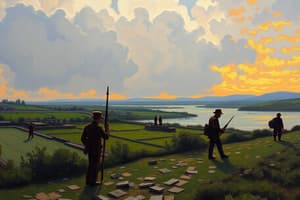Podcast
Questions and Answers
What was a major cause of World War I?
What was a major cause of World War I?
- Assassination of Franz Ferdinand (correct)
- Invention of the airplane
- Economic depression
- Women's suffrage movement
The Schlieffen Plan aimed to quickly defeat France before turning to fight Russia.
The Schlieffen Plan aimed to quickly defeat France before turning to fight Russia.
True (A)
What innovation in warfare is often associated with World War I?
What innovation in warfare is often associated with World War I?
Tanks
The ______ Treaty formally ended World War I.
The ______ Treaty formally ended World War I.
Match the following topics to their descriptions:
Match the following topics to their descriptions:
Flashcards
What was the immediate trigger of World War I?
What was the immediate trigger of World War I?
The assassination of Archduke Franz Ferdinand of Austria-Hungary in Sarajevo, Bosnia, on June 28, 1914, by Gavrilo Princip, a Serbian nationalist, is considered the immediate trigger of World War I. This event sparked a diplomatic crisis between Austria-Hungary and Serbia, leading to a chain reaction of alliances and declarations of war.
What was the German military strategy in the early stages of WWI?
What was the German military strategy in the early stages of WWI?
The Schlieffen Plan was a German military strategy developed before World War I. It aimed for a swift victory over France by bypassing its defenses through Belgium, then turning to defeat Russia on the Eastern Front. The plan's goal was to avoid fighting a war on two fronts.
What treaty ended World War I?
What treaty ended World War I?
The Treaty of Versailles, signed in 1919, officially ended World War I. It imposed harsh terms on Germany, including territorial losses, disarmament, and war guilt. These terms, seen as punitive, contributed to resentment and instability in Germany, impacting the world in the years to come.
What organization was established to prevent future wars?
What organization was established to prevent future wars?
The League of Nations was an intergovernmental organization established after World War I to prevent future conflicts. It aimed to promote international cooperation, disarmament, and settling disputes peacefully. While it had its successes, its effectiveness was limited by the lack of strong enforcement power, particularly from major powers like the United States, which did not join.
Signup and view all the flashcards
How did women contribute to the war effort?
How did women contribute to the war effort?
Women's contributions to World War I were significant. They took on a wide range of roles previously held by men, working in factories, farms, and in support of the military. This experience challenged traditional gender roles, paving the way for greater opportunities for women in the post-war era.
Signup and view all the flashcardsStudy Notes
Week 1: Causes and Origins of World War I
- Suffragists and Suffragettes: A historical movement advocating for women's right to vote.
- Origins of WWI: Complex factors led to the outbreak of World War I.
- Causes of WWI: Nationalism, imperialism, militarism, and alliances contributed significantly.
- Assassination of Franz Ferdinand: The assassination of Archduke Franz Ferdinand, heir to the Austro-Hungarian throne, sparked the conflict.
- Schlieffen Plan: A German military strategy to quickly defeat France in the early stages of the war.
Week 2: Wartime Experiences and Propaganda
- Propaganda and Recruitment Posters: Used to influence public opinion and encourage enlistment.
- Defence of the Realm Act: Legislation restricting speech and actions deemed detrimental to the war effort.
- Trenches: The primary form of warfare on the Western Front, characterized by static lines and brutal conditions.
- Life in the Trenches: Harsh conditions including disease, mud, and constant bombardment affected soldiers' morale and well-being .
Week 3: Weapons, Poetry, and Global Impact
- WWI Weapons: Developments in weaponry like machine guns, poison gas, tanks, and airplanes transformed warfare.
- WWI Poetry: Expression of the horrors and experiences of the war through literary works.
- India’s Contribution to WWI: Indian soldiers and resources contributed significantly to the Allied war effort.
- Battle of the Somme: A major battle on the Western Front known for its devastating casualties and inconclusive outcome.
Week 4: Women, War's End, and Aftermath
- Women's Contribution to the War: Women took on roles in factories and other essential jobs as men fought in the war.
- End of WWI: The conflict concluded with an armistice, eventually resulting in peace treaties.
- Women after WWI: Women's roles and rights were evolving beyond the war.
- Treaty of Versailles: A peace treaty that imposed harsh conditions on Germany, a significant factor in the causes of WWII.
- The League of Nations: An international organization created to prevent future wars, but ultimately unsuccessful in its goals.
Studying That Suits You
Use AI to generate personalized quizzes and flashcards to suit your learning preferences.




